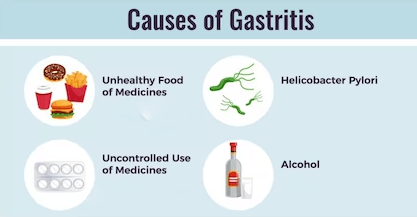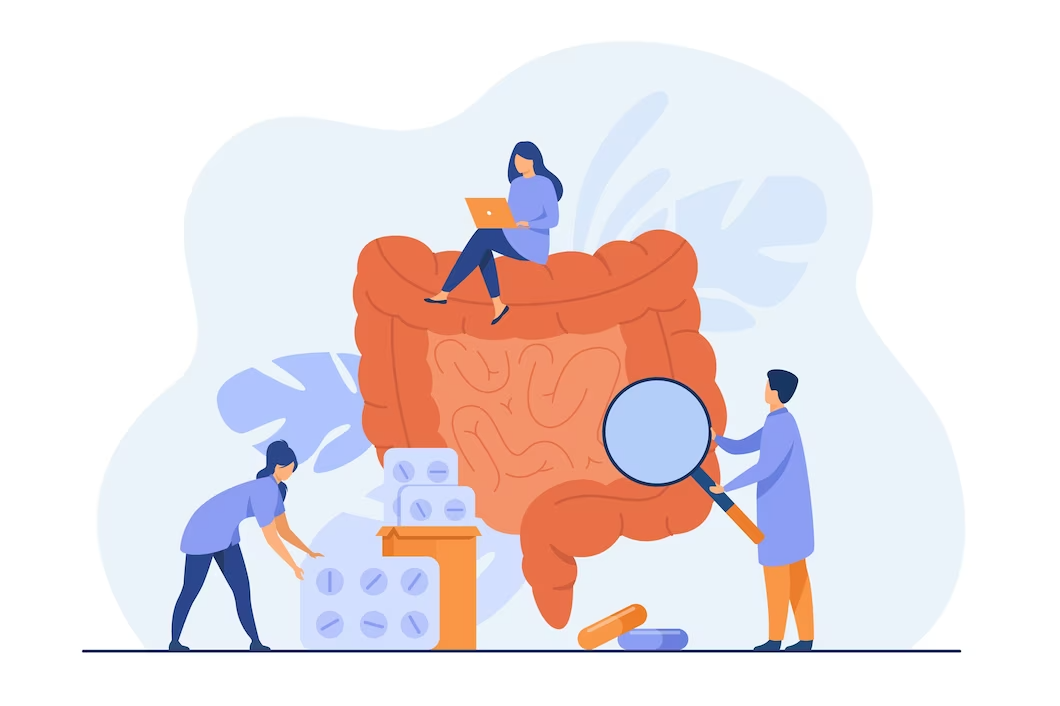Gastritis is very common. It occurs when the lining of your stomach becomes swollen (inflamed). Gastritis is usually mild and resolves without any treatment. However, gastritis can cause pain in the upper part of your tummy (abdomen) and may lead to a stomach ulcer.
Some simple changes to your lifestyle and using over-the-counter antacid medicines are often all that is required. Other medicines to reduce the acid in your stomach are sometimes needed. Gastritis usually resolves without any problems. However, if not treated properly, gastritis can last for a long time or may lead to a stomach ulcer or cause anaemia.
Many people with gastritis don’t have any symptoms. However, gastritis can cause indigestion (dyspepsia).
Symptoms of gastritis may start suddenly and resolve quickly (acute gastritis) or may develop slowly and last for a long period of time (chronic gastritis).
Pain in your upper tummy (abdomen) just below the breastbone (sternum) is the common symptom. It usually comes and goes. It may be eased if you take antacid tablets. Sometimes food makes the pain worse. The pain may also wake you from sleep.
Other gastritis symptoms which may occur include:
- Loss of appetite.
- Bloating.
- Retching.
- Feeling sick (nausea).
- Being sick (vomiting).
- You may feel particularly ‘full’ after a meal.
What causes gastritis?
Your stomach normally produces acid to help with the digestion of food in your digestive tract and to kill germs (bacteria). This acid is corrosive, so some cells on the inside lining of the stomach produce a natural mucous barrier. This protects the lining of the stomach and the first part of the small intestine (the duodenum). There is normally a balance between the amount of acid that you make and the mucous defence barrier. Gastritis may develop if there is an alteration in this balance, allowing the acid to damage the lining of the stomach.
Infection with H. pylori gastritis
Infection with H. pylori is the cause in about 8 in 10 cases of stomach ulcer. Once you are infected, unless treated, the infection usually stays for the rest of your life.
Anti-inflammatory medicines - including aspirin
Anti-inflammatory medicines are sometimes called NSAIDs. Many people take an anti-inflammatory medicine for joint inflammation (arthritis), muscular pains, etc. These medicines sometimes affect the mucous barrier of the stomach and allow acid to cause an ulcer. About 2 in 10 stomach ulcers are caused by anti-inflammatory medicines.
Other causes
A stressful event – such as a bad injury or critical illness, or major surgery. Exactly why stress and serious illness can lead to gastritis is not known. However, it may be related to decreased blood flow to the stomach.
Less commonly, gastritis can be caused by an autoimmune reaction – when the immune system mistakenly attacks the body’s own cells and tissues (in this case, inflammation of the stomach lining). This may happen if you already have another autoimmune condition, such as Hashimoto’s thyroid disease or Type 1 diabetes.
Other causes of gastritis include cocaine abuse or drinking too much alcohol. Occasionally viruses, parasites, fungi and bacteria other than H. pylori are the culprits.
What tests may be done for gastritis?
Your GP can usually make a diagnosis of gastritis by taking a history of your symptoms and an examination of your tummy (abdomen). Mild gastritis does not usually need any tests.
If gastritis doesn’t get better quickly or causes severe pain then certain tests will have to be done to diagnose and confirm Gastritis.
Gastroscopy (endoscopy) is the test that can confirm gastritis. In this test a doctor looks inside your stomach by passing a thin, flexible telescope down your gullet (oesophagus). They can see any inflammation or if there is any other abnormality, such as a stomach ulcer. Not everyone with symptoms of gastritis will need to be referred for an endoscopy.
Small samples (biopsies) are usually taken of the stomach lining during endoscopy. These are sent to the laboratory to be looked at under the microscope. This also checks for stomach cancer (which is ruled out in most cases).
A test to detect the H. pylori germ (bacterium) may also be done. H. pylori can be detected in a stool test (faeces), or in a ‘breath test’, or from a blood test, or from a biopsy sample taken during an endoscopy.
Having a barium swallow and X-ray is another way to look for changes (such as ulcers) in the stomach lining. It is not as accurate as an endoscopy.
We have a effective treatment for gastritis with Homoeopathic Medicines



